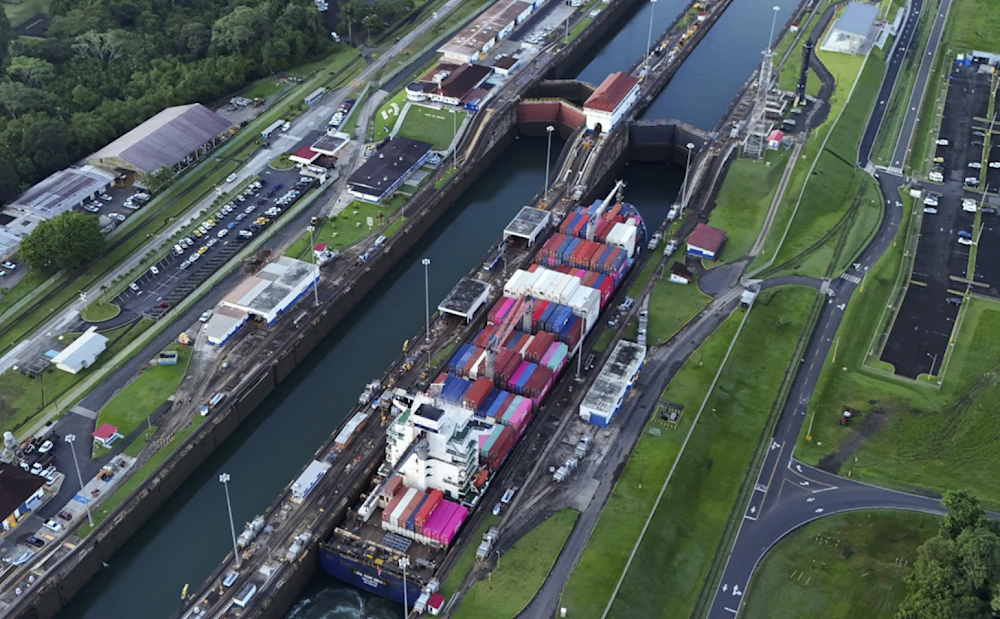Climate change, not China, threatens Panama Canal's future: NYT
Dennis M. Hogan highlights that Trump's vision of international competitiveness appears to be that maritime routes, such as the Panama Canal, should be seized, controlled, and monopolized rather than shared among states with fair access for everyone.
-

A cargo ship traverses the Agua Clara Locks of the Panama Canal in Colon, Panama on September 2, 2024. (AP)
According to Dennis M. Hogan, Donald Trump's recent threats to retake the Panama canal and accusations of China threatening US interests mean he misunderstood the "true threat" of US commerce.
Trump last week slammed what he called unfair fees for US ships passing through the Panama Canal and threatened to demand Washington gain control over the waterway, describing China's growing influence around the canal, which he considers a threat to US interests since US businesses depend on the channel to transfer goods between the Atlantic and Pacific oceans.
Hogan writes in the New York Times how in a visit to the canal in July 2023, many locals were panicked about low rain despite being in the middle of the rainy season, noting that water levels in the canal had "sunk to troubling lows."
The locks on the canal would not work without fresh water from rain, and if US authorities want to ensure long-term inexpensive access to the transit point, they should be concerned about climate change rather than Chinese influence, Hogan says.
He details how sending a single ship through the canal's locks may require roughly 50 million gallons of water, mostly freshwater from Lake Gatún. Though the canal is now functioning at full capacity, a drier environment and increased demand for drinking water have limited the amount of water available in recent years. This has compelled the state-run Panama Canal Authority to limit the number of daily canal passes, at times by up to 40%.
With less rain, the reservoirs fill more slowly, leaving less water to run the locks and allowing fewer ships to pass. As a result, the 2023-24 drought, one of the worst on record, delayed transits and raised transit charges, resulting in lengthier waits, more expensive consumer products, and increased volatility in shipping routes, things Trump labeled a "rip-off."
Alternate modes of transportation being looked into
The restricted number of crossings has resulted in auctions for passage rights, raising the already high cost of moving products through the canal. In the near run, limited access causes commodities to take longer to reach their destinations and cost more when they do.
According to Hogan, businesses are looking into alternate modes of transportation, with projects like a railway corridor in southern Mexico emerging as direct competitors to the Panama Canal. The canal's strategic relevance may deteriorate over time as increased commerce volume and bigger ships compete for a limited supply of water.
The 2023-24 drought, exacerbated by climate change-related El Niño, has led to decreasing water levels and impacted canal operations.
Trump's recent statements garnered criticism in Panama, and according to Hogan, Trump risks "alienating a country that remains friendly to the United States despite a long history of US arrogance" toward its people.
Hogan believes these are nations whose destinies are linked since many Americans have Panamanian ancestors, and a growing number of Americans reside in Panama. Migrants from Haiti and Venezuela are crossing the Daríén Gap between Colombia and Panama to reach the US, creating a humanitarian disaster and new obstacles for both countries.
He notes that Trump's vision of international competitiveness appears to be that maritime routes, such as the Panama Canal, should be seized, controlled, and monopolized rather than shared among states with fair access for everyone.
Panama president rules out talks with Trump over canal threat
Last week, Panamanian President Jose Raul Mulino rejected talks with Donald Trump over ownership of the Panama Canal.
Mulino also rejected the idea of lowering canal charges for US vessels and claimed that China had no control over the crucial waterway that connects the Atlantic and Pacific seas.
"If there is an intention to talk, then there is nothing to talk about," Mulino stated at a weekly news conference.
He added that the canal is "Panamanian and belongs to Panamanians," further adding, "There's no possibility of opening any kind of conversation around this reality, which has cost the country blood, sweat and tears."
Mulino firmly dismissed Trump’s remarks on Sunday, stressing that "every square meter of the Panama Canal and its adjacent areas belongs to Panama and will continue belonging to Panama."
Mulino stated that the usage costs were "not set at the whim of the president or administrator" of the interoceanic canal, but rather through a long-established "public and open process."

 5 Min Read
5 Min Read










